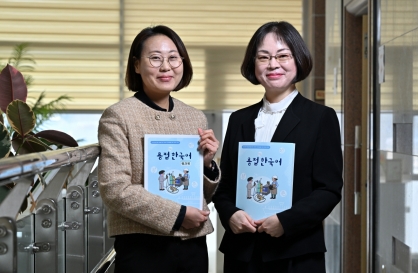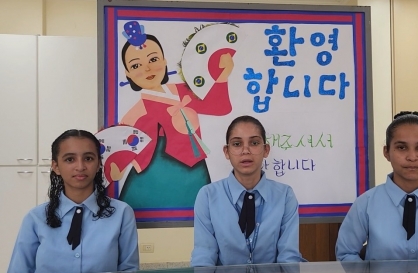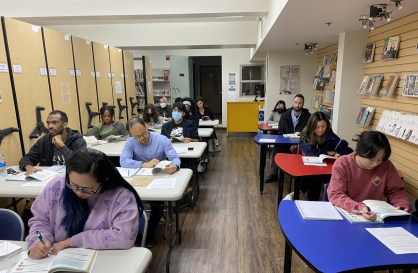Most Popular
Hello Hangeul
-
1
Welding book first in vocational Korean series for foreign labor

-
2
[Korea Beyond Korea] In Sao Paulo, horizons expand for Korean studies
![[Korea Beyond Korea] In Sao Paulo, horizons expand for Korean studies](//res.heraldm.com/phpwas/restmb_idxmake.php?idx=644&simg=/content/image/2023/11/20/20231120000619_0.jpg&u=20231206104853)
-
3
In Brasilia, worldly dreams are born from Korean classes

-
4
Americans seeking to visit Korea learn the language in LA

-
5
[Korea Beyond Korea] Berlin, Europe's Korean Studies hub, nurtures next-gen experts, scholars
![[Korea Beyond Korea] Berlin, Europe's Korean Studies hub, nurtures next-gen experts, scholars](//res.heraldm.com/phpwas/restmb_idxmake.php?idx=644&simg=/content/image/2023/10/18/20231018000929_0.jpg&u=20231023154735)
[Hello Hangeul] Does it pay off to become fluent in Korean?
By Jung Min-kyungPublished : March 5, 2023 - 15:40

Mastering a foreign language requires a long-term commitment that can take years. Without the promise of it becoming a valuable asset to your professional or personal life, it can be difficult to stay committed.
What are the rewards for attaining fluency in Korean? Will the time and energy learners put into learning the language pay off in some way other than being able to watch K-dramas without subtitles?
To explore the benefits of learning Korean further, The Korea Herald spoke to four non-Koreans who command a high level of proficiency in the language and who have built a life around it.
For Cao Thi Huong, 30, Korean language skills have been a major plus in terms of job opportunities in her native Vietnam.
“As a newscaster in Vietnam, I started to cover a lot of events hosted by the Korean Culture Center there around 2016. It was becoming difficult for me to attend the events without knowing Korean, which is why I started to learn the language,” Huong told The Korea Herald.
She had to balance her work as a newscaster and her studies, which was grueling at first. But her efforts eventually paid off as it began to pave the way for her career.
“It took me years to become fluent in both writing and speaking. I began to win awards with my Korean skills at Korea-related contests, which helped me win scholarships to study at a university in Korea.”
She is now doubling as a university student in Korea and a corporate interpreter.
“It is extremely easy to get a high paying job in Vietnam if you’re fluent in Korean. On top of it, it’s also a way to do multiple jobs,” she said.
Fluency in Korean also helped UK-born Paul Carver land a job as a public servant under the Seoul Metropolitan Government in 2016. As a former head of the Seoul Global Center, Carver was Korea's highest ranking foreign public servant until he quit it in 2021.
"I started off with Hangeul with two semesters at King Sejong Institute 20 years ago," Carver said via email.
"After that I just learnt by living in Korea. Korean is quite a dynamic language with new words appearing all the time so I expect I'll always be learning."
Carver said even if he was fluent enough to be hired by the city government, it was necessary for him to learn new words and jargon to work there.
"I had to learn new Korean words to be able to answer questions at the city council, communicate with employees and suppliers and write budget reports," he explained.
Mariya, an office worker in Russia, works at a Korean company in Moscow in a position that requires her to use her language skills daily.
“My interest in the Korean language began with my love for Korean dramas,” she said.
“After I visited Korea in 2015, I began to search for ways to learn the language more efficiently. I soon flew to Korea after I found about Sogang University Korean Language Education Center and attended the program for two years.”
She had to return to Russia in 2020 because of the COVID-19 pandemic, but her freshly acquired skill in Korean kept her busy. A branch of a Korean company in Moscow hired her as a manager and an interpreter.
“I feel great about learning Korean whenever I translate between Russian and Korean. I feel like I’m bringing down the language barrier and keep the business running.”
For Ali Abbot from Britain, the biggest benefit was her having been able to settle down in in Korea without many difficulties.
“Studying Korean has opened so many doors for me. It means that I can live here without too many barriers and function normally and comfortably in everyday life,” she said.
“I have never had trouble living here because learning Korean removed all barriers for me, from ordering food or taking a taxi, to going through visa processes and dealing with government documents. … Because I speak the language, I can communicate with (my husband’s) family easily and really become close with them.”
TOPIK is a must
What Huong, Carver, Mariya and Abbot have in common is their high scores on the state-managed Test of Proficiency in Korean, which measures ability to understand Korean grammar, reading, listening and writing for non-native speakers. Speaking will be added to the test from 2023.
Huong and Mariya both scored the second-highest level -- Level 5 -- on the test, while Abbot clinched the highest Level 6.
Carver said that it was mandatory for foreign applicants to score at least Level 4 on the test to be hired as a public servant by the Seoul government.
Although there is criticism that TOPIK is not a reliable gauge on one’s actual Korean skills, as there are not many alternatives to it, it is strongly advised that learners take the exam and get a high score, particularly if they want to find a job in Korea or Korea-related businesses overseas.
“It’s a solid proof that you can handle the work in Korean,” Mariya explained.
Huong’s new goal is to score Level 6 on the test, as it would “open so many more doors to her career.”
Carver said that the test is a "good way of judging someone's ability, but doesn't think it should be mandatory" if there are more efficient ways of assessing the learners' fluency.
The number of applicants for TOPIK, launched in 1997, has been steadily increasing by an annual 15 percent, the Ministry of Education recently said. It jumped from 290,600 in 2017 to 330,012 in 2021, government data showed.
Native-level fluency is daunting
Because the writing system is pretty easy to pick up for beginners, one may get an impression that Korean is an easy language to learn. But it is quite the opposite, the four interviewees said.
That is also what many linguists say. While there are only 24 letters in the alphabet, its connectors and honorifics give its sentences many variations.
Also, when learners delve deeper for a professional level of Korean, the expansive lexicon composed of Chinese characters often poses a major hurdle for them.
“The hardest part (in learning Korean) for me was structuring what I learned through conversation into formal reading and writing. Because I learnt most of my Korean through casual conversations with friends, I could talk fluently but my writing was still very basic,” said Abbot.
She recommended taking a formal Korean language class, which would help translate the knowledge into a formal, written medium.
The fact that many Korean words had many homonyms was also a major hurdle in becoming an advanced speaker for Huong.
“It’s not an easy language to breach the barrier to become an advanced writer and speaker from a beginner. I was confused with so many homonyms at first,” she said.
“But once you enter the next level, everything is different in terms of the opportunities you get.”




![[Korea Beyond Korea] In Sao Paulo, horizons expand for Korean studies](http://res.heraldm.com/phpwas/restmb_idxmake.php?idx=644&simg=/content/image/2023/11/20/20231120000619_0.jpg&u=20231206104853)


![[Korea Beyond Korea] Berlin, Europe's Korean Studies hub, nurtures next-gen experts, scholars](http://res.heraldm.com/phpwas/restmb_idxmake.php?idx=644&simg=/content/image/2023/10/18/20231018000929_0.jpg&u=20231023154735)







